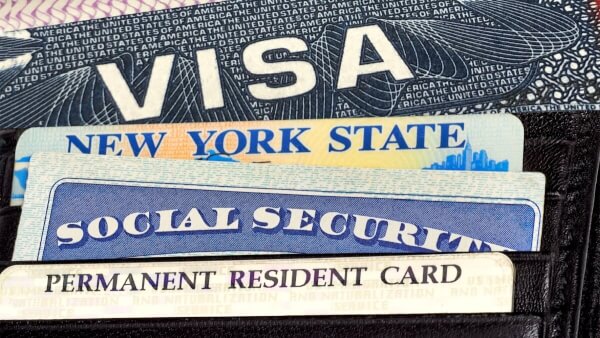Transferring your international driver's license to the US: step-by-step
Your full guide to updating your foreign driver's license to the US.

America may be known as the land of opportunity, but there’s so much to explore outside of the States as well. If, like so many Americans, you’re tempted by a new experience working in Europe, you might well be wondering exactly what sorts of jobs you could do there.
This article will help you get started. It’ll offer you some practical tips on finding a job, how to get a visa, and what you need to know in order to make a success of your move abroad.
Before we get going, let’s head back to the classroom for a minute. You probably know all this, but it’s vital to get the basics right, so it’s time for a little Europe 101.
First off, Europe is not a country. It’s an entire continent, made up of many different nations: 44 according to the United Nations. Interestingly, some countries like Russia and Turkey span both Europe and Asia. In Turkey’s capital Istanbul, you can cross the border between Europe and Asia using a bridge or a ferry over the Bosphorus Strait, and be in a new continent in just a few minutes.
Within the continent of Europe you also find the European Union (EU). The EU is a group of 27 member states with particularly close political and economic links.
The United Kingdom was formerly a member of the EU, but voted to leave in 2016 (known as Brexit), and finally completed the move away from the EU in 2020.
You may also hear of the Schengen Area when you’re researching Europe. This is a group of 26 countries — mostly EU members — which cooperate to issue visas which allow people to travel freely between countries within the group.
That makes it easier to cross borders as a tourist without needing new paperwork every time.
Many EU countries share a currency — the euro. Although Europe is also home to many other currencies, from the Hungarian forint to the Turkish lira.
Each European country has its own history, culture, government and set of employment laws. The economic situation, strengths and challenges of each country is different — with levels of wealth and standards of living varying by region. Europe is also home to 24 official languages — with something more like 200 languages commonly spoken among inhabitants who hail from all 4 corners of the world.
It’s safe to say that a large chunk of Europe could fit inside the US, but the opportunities and experiences available as an expat American will vary widely depending on the country you choose. That’s why it’s crucial to do your research and narrow down your options before going after a job.
Want to send Euros? See how much you may save with a Wise Account:

Just like anywhere in the world, there’s no simple formula for finding a European job. It depends on who you are, what you like doing and what you’re good at, as well as where you’re going. But it’s possible to maximize your chances of finding your ideal job by thinking carefully about the following.
As explained above, one size does not fit all when it comes to choosing a new European home. Europe has it all, from the bustling internationalism of London or Berlin to the tranquility of northern Scandinavia or the Greek islands.
If you want to maximize your chances of finding work but don’t yet have a plan worked out, consider the big cities first of all. Just like in the US, that’s where you’ll find the most work opportunities, as well as the liveliest communities of expats.
At the end of this article, you’ll find a few of the most popular areas in Europe for Americans to find work. Try to get a feel for the unique character of a few different places in Europe before you make your choice: it makes a huge difference.
Also like in the US, jobs in Europe can be low-paid or high-paid, skilled or unskilled, permanent or temporary, and so on. You might well find that you’re qualified for more or less the same jobs that you could get in the US.
But there are two important differences. The first is language. If you can’t speak the language in your new home country, you’re going to limit your employment prospects: read more about this below. The second is the right to work. As a foreign citizen, you won’t have the same employment rights as a native. So you should carefully research what you are and aren’t allowed to do, long before you pack your bags.
If you just speak English but you’re keen to go to a European country other than the UK or Ireland, you’ll have more luck in some career sectors than others. Here are a few of the careers in which you might have more luck.
Teaching English as a foreign language (TEFL). The classic profession for traveling English speakers is TEFL, which turns your key limitation — only speaking English — into a strength. Get a TEFL certification, and then choose your location carefully: unlike with many expat careers, it’s easier to teach English abroad in less developed areas. In big Western European cities, competition among English teachers can be fierce. In smaller towns and less prosperous countries, on the other hand, there’s still demand, and fewer native speakers to meet it.
Tourism. Another way to turn a lack of language skills into a strength is to seek out jobs in tourism or hospitality, where English is the closest thing there is to a global language. You might be able to find work in a bar or at a resort. Any good at skiing? Maybe you can find work in the Alps. A lot of these jobs might only be short-term or seasonal, though.
Digital nomadism. Thanks to the internet, it’s often possible to work remotely these days. Some people even maintain full-time jobs in foreign countries, working from a home office. Alternatively, you can go freelance and look for work in areas like journalism or programming, where it’s often possible to work from far away. The world is the digital nomad’s oyster.
Any job in Ireland or Malta. One big point in favor of finding work in Ireland or Malta is that you won’t have a language barrier to worry about. So if you’re not yet decided on your location, this could be something to consider.
All that said, if you’re serious about living abroad, you should learn the language of your new home country. Start learning properly as soon as you can.
Once you reach a decent level, you might find more employment opportunities opening up fast. More than that: your quality of life will improve, too.
| Check out our guide on ways of making money while traveling |
|---|
Finding a high paying job in Europe will allow you to enjoy a better standard of living, and make more of your time there. The availability of high paid jobs will vary a lot depending on where you’re headed and the field you work in. If you’re already working with a global organization, it may be worth seeing if you can transfer to Europe with your existing company. This helps you leverage your experience and settle into your new home.
If you’re not able to transfer with your current employer, you’ll need to do some research based on the average salaries in your field and preferred location. A great place to check resources are websites such as Teleport or Numbeo, which gives aggregate data for salaries — and costs of living — in many European cities. Top jobs tend to be in fields like management consulting, medicine and research, finance and technology — but you’ll be able to see how salaries vary by location easily to help you decide where to head.
Typical European CVs are on the short side — no more than 2 sides of paper. They’ll usually include a short personal statement which highlights your career goal or the type of role you’re looking for, your qualifications, and your work experience in reverse chronological order. You don’t need to include details of interests or hobbies unless they directly relate to your profession.
Different European countries have different expectations when it comes to the amount of personal details you add to your CV, so you’ll probably want to double check the norms wherever you’re heading.
For example, British CVs would not usually include a photo or any details about your age, whereas some Southern European countries like Portugal, Spain and Greece typically have a photo and a set of personal information including your nationality, age and mailing address.
| Need inspiration to get started? Try out our free resume templates |
|---|
Whether you’re a digital nomad or a wannabe cocktail waiter, the first place to start looking for work is always the internet. But how do you find a job?
If you’re not physically in Europe yet, the internet is your ally. Look for openings in your area of interest through platforms such as LinkedIn, Eurojobs, JobsInNetwork or UpWork — for freelancer gigs.
Industry-specific job boards, like TEFL for English teachers, are also worth a close look, especially if you’re flexible on location. If you’re certain about your line of work, this approach could be your best bet for finding the perfect job.
In case you already have a company in mind, check their websites for available roles — some of them, such as Wise — even allow you to create an alert for job openings.
Another option, if you’re already in EU soil, is to find a job center or pay local language schools, bars and hotels a personal visit to ask about employment prospects.
Don’t underestimate the distinctness of each European country, though. As an early test of your language skills, try to find the job boards that the locals use themselves.
When moving to a new country, sending money and creating a new bank account are usually key things to consider.
Banks usually charge very high fees for sending money to Europe. If you’re looking for ways of saving when moving money abroad, make sure to try Wise.
| With Wise you can |
|---|
|
Please see Terms of Use for your region or visit Wise Fees & Pricing for the most up to date pricing and fee information.
Employment laws are different in every country, and the countries of Europe are no exception. As a US citizen, you won’t have the same rights as a citizen of the European country you want to move to. But exactly what rights you will have, and what sort of documentation you’ll need, varies from place to place. You might find you don’t need to get a visa before traveling, but don’t take it as read.
In Germany, for example, US citizens are allowed to enter the country without a visa and apply for a EU work permit once they’re there or to be a freelancer.¹ But if you want to work or live in Norway for more than 90 days, you’ll need a residence permit, which you should apply for via Norway’s US embassy or consulate².
The key thing to remember is this: as an American citizen, you don’t automatically have the right to work in Europe. You’ll have to apply for that right via whatever system your chosen country has in place.
Here are some more words of advice for your European adventure.
It’s true that English is the most widely spoken language in the world. You’ll find many English speakers in any big European city. But that doesn’t mean you should rely on it: forcing people to speak a foreign language to you isn’t a great way to make friends — or to find a job.
What’s more, outside of major cities, plenty of people don’t speak any English at all. You’ll be amazed at how many more doors open for you when you can speak the right language.
Think there’s a lot of paperwork in the US? You might be unpleasantly surprised by your new place of residence. Some European countries require a lot of official documentation, citizen registration numbers, tax ID numbers, VAT numbers, registration at various offices, and so on and so forth. Just roll with it. It’s easier in the long run.
Good news: you’ll probably get more annual vacation time than you would in the US. Bad news: you might have to give your employer several months’ notice before you can leave.
Besides these, there could be plenty of other differences between European work contracts and their American equivalents, so try not to act too surprised.
Of course it depends on your job, but generally speaking, work has a different feel to it in Europe than it does in the US. Americans work famously long hours, so you might have a shorter working week — but don’t be fooled into thinking that means you can be less productive: it’s all about efficiency.
You can also expect a more relaxed lunch hour, with staff often leaving their desks or even going out for a real break. In some European countries, especially around the Mediterranean, lunch breaks can last for several hours.
It’s called work life balance, give it a try.
So, then. Where should you go? Really it’s down to you, what you like, what work you want to do and so on. But here are a few of the places in Europe with the most Americans living there, to get you started.

Home to a significant number of US citizens, Germany boasts a truly global city in Berlin, and many other spectacular places to live like Munich, Hamburg and Cologne.
It’s a very wealthy country, so it might be harder to find work here than in some other European countries. But don’t let that put you off: there are still plenty of opportunities.
| Read all about finding jobs in Germany for Americans in our guide |
|---|

If you want to move to France, you’ll certainly need to get the hang of speaking French: Emily in Paris taught us enough not to think you’ll be able to get by just with English.
But it’s worth the effort to live in this gloriously cultured country. Paris is the best bet for jobs, but if you’re planning on teaching English, you could try your luck somewhere smaller.
| Not sure if France is the right place for you? Peruse through these 15 destinations in the French countryside and figure it out for yourself. |
|---|

Another beautiful and unique country, Italy is the perfect destination for lovers of sun-soaked, three-hour lunch breaks, which, let’s face it, is pretty much everyone.
It’s not all about the capital, Rome, although it has much to recommend it: also consider fashion mecca Milan, or Naples if you feel like heading further south.
| Learn more about getting an Italian job and work visa |
|---|

Madrid and Barcelona are totally different from each other, yet both cities are equally captivating. Then again, so are other Spanish cities like Seville and Valencia.
If you’re keen to tap into the tourism market, Barcelona might be worth a try, or other coastal destinations. For other jobs, Madrid is calling your name.

The Netherlands may bring to mind wild parties in Amsterdam or romantic strolls through tulip fields, but there are also many great job opportunities throughout the country.
Major industries include oil and gas, agriculture and food export, and engineering. The Netherlands also has an advanced chemical industry, and is home to many leading multinational chemical companies like Royal Dutch Shell. Even better, English is widely spoken in the Netherlands which makes finding a position in a global or US business a possibility even if you don’t speak Dutch.
| Read our full guide on finding a job in Amsterdam |
|---|

Norway, Sweden, Denmark, Finland and Iceland make up the Nordic countries, often called Scandinavia. They’re well known for their high quality of life, although — as beer drinkers quickly discover — it comes at a cost.
Locals tend to speak immaculate English and of course the scenery of cities like Stockholm and Helsinki is stunning, as are the more remote parts of the region.

The Baltic countries are Estonia, Latvia and Lithuania. They’re geographically close, but quite diverse in their cultures and languages. The main areas to look for jobs will be in the capital cities of the 3 countries — Tallinn, Riga and Vilnius, although there are also many beautiful smaller cities and towns scattered throughout the region which may be a good bet if you’re looking for something off the beaten path.
The Baltic countries have long been home to traditional industries like wood and textile processing, and have a history of exporting goods that stretches back to the middle ages and beyond. However, in recent years the region has become famous for more high tech and entrepreneurial companies, with many startups choosing to base themselves in the area.
As we’ve mentioned earlier on, the UK is no longer part of the EU, so if you’re looking for a job there, it might be worth checking out specific websites for the official regulations.
But don’t worry, you can still find English speaking countries to suit your needs:

Malta offers a pretty perfect climate and a relatively relaxed way of life — as well as being an English speaking option for Americans looking to work in Europe. Check out popular positions in web and blockchain development, accounting and tourism, as well as a range of customer service roles.

If you’re looking for a friendly welcome, the Emerald Isle might be your top pick. While capital Dublin might be the biggest draw for expats, there are also positions for English speakers throughout the country, in sectors as diverse as industry, tourism, education and medicine.
Find attractive US companies hiring in Europe with some research into multinational companies in your particular professional field. Many corporate US companies have headquarters and offices, in Europe, as well as offering positions around the region in customer facing positions.
You could also look at large businesses involved in travel and tourism, from airlines to hotel chains — or global firms involved in management consulting, accounting, engineering, pharmaceuticals and a broad range of other sectors.
Different US companies hire for roles on an ongoing basis, and will usually need to start by advertising positions in their local region to see if anyone in their base country can fill the role.
For that reason, finding a great job with an American company in Europe might take a little while — draw on your personal and professional network to make sure you get all the details about positions ahead of time.
Wherever you choose, good luck in getting yourself set up in your new home. Don’t forget to try and deal with your international finances in the cheapest way possible, and that Wise might be able to help.
And, of course, try to see as much of this amazing continent as you can.
Sources:
Sources checked on 02.28.2022
*Please see terms of use and product availability for your region or visit Wise fees and pricing for the most up to date pricing and fee information.
This publication is provided for general information purposes and does not constitute legal, tax or other professional advice from Wise Payments Limited or its subsidiaries and its affiliates, and it is not intended as a substitute for obtaining advice from a financial advisor or any other professional.
We make no representations, warranties or guarantees, whether expressed or implied, that the content in the publication is accurate, complete or up to date.

Your full guide to updating your foreign driver's license to the US.

Stretch your dollars when studying abroad, use Wise.

Everything you need to know about international schools in Manila, Philippines.

Selling property abroad? Check out our guide to maximize returns with these strategies from experienced tax specialists.

Understanding the best study abroad scholarship opportunities for US citizens.

Get ready to study abroad with our guide.